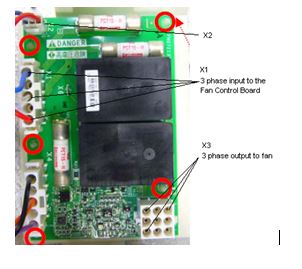The Drive Overheat Fault (OHF) indicates that the heat sink temperature has crossed the temperature threshold. This is the information from the temperature sensor located on the heat sink, near the transistor module. When the Thermal Heat Dissipation (THD) is greater than 118% it trips in OHF. 118% is approximately 100 Deg Centigrade temperature on the heat sink.
The main causes for the occurrence of this fault are:
1. Excessive ambient temperature. (Provide proper air cooling of the control room)
2. Fan air flow is blocked.
3. The minimum air clearance required around the Drive as indicated in the Installation Guide is not maintained.
4. Drive cooling fan not working.
(Check the LEDs on the Fan Supply Board. If LED 1 is off, then the fan is not working. If LED 2 is off then Fan Supply Board is out of order.)
5. The temperature sensor is faulty.
ATV61/71 Fan Troubleshooting
Is the heat sink fan running?
What is the drive thermal state?
1. For size 2 to 5b
a. Check the fan cable connection.
b. Check fan for obstruction.
c. Check voltage on fan connector.
2. For the HHP VFD 125 HP and above
a .Are the fuses on the fan control board blown?
b. What is the voltage on X1 (Line voltage phase to phase)
c. What voltage is measured on X3 pin 3, 7 and 9 when drive thermal state is above 70 % or a run command is active? (Should be line voltage phase to phase, when fan is supposed to be running)
d .Do the relays chatter on the fan control board? (If yes, then the drive is not sensing voltage on control card.)
e. The voltage on X2 between pin 1 and 3 should be 15vdc. Pin 3 is the command to run.

ATV61/71 Fan Troubleshooting
Is the heat sink fan running?
What is the drive thermal state?
1. For size 2 to 5b
a. Check the fan cable connection.
b. Check fan for obstruction.
c. Check voltage on fan connector.
2. For the HHP VFD 125 HP and above
a .Are the fuses on the fan control board blown?
b. What is the voltage on X1 (Line voltage phase to phase)
c. What voltage is measured on X3 pin 3, 7 and 9 when drive thermal state is above 70 % or a run command is active? (Should be line voltage phase to phase, when fan is supposed to be running)
d .Do the relays chatter on the fan control board? (If yes, then the drive is not sensing voltage on control card.)
e. The voltage on X2 between pin 1 and 3 should be 15vdc. Pin 3 is the command to run.
Released for:Schneider Electric India





